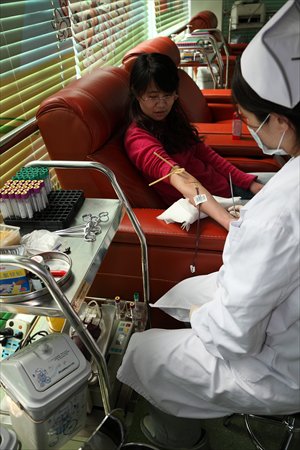Out for blood

On December 30 around 6 am, 20 people piled into a minivan that had just four seats at a bus station in Shunyi district, Beijing. Soon after the van hit the road, a man named Lele collected their identity cards.
They were on their way to sell their blood.
They were packed in too tightly to look out the window. People crowded at the back were not able to see outside to know where they were headed. "It was like we had been kidnapped and blindfolded, all we could do was follow," one of the sellers was quoted by the Beijing Times as saying.
On the way, Lele asked each of them to take 17 or 18 yellow pills which would help them pass physical examinations. Doctors suggest that at one time, patients should only take five of these pills, which decrease the levels of transaminase enzymes in the blood.
The van later arrived at a theater located in the yard of Yujiayuan village in Huairou district. While lining up in the theater, the blood-sellers were asked to sign donation forms. All of the information on the forms, including their personal health status and ID numbers were already filled in.
In regard to where they work, the organizer wrote the name of a village. It was not where they worked, but it was enough for the forms.
A seller surnamed Hao was given a certificate demonstrating that he worked in a company in Xinxianjie village, with the signature of a village official and the stamp of village committee in case the staff at the blood station doubted him.
Five out of the 20 sellers were found physically unfit for blood collecting and the other 15 each provided 400 milliliters and were given a donation certificate. These people received 400 yuan ($64.24) in cash from Lele.
A source told the Beijing Times that villages in Beijing are assigned a certain number of blood donors, but the actual donors are usually far below the number required, which provides a business opportunity for organizers like Lele.
An organizer usually pays 200 yuan for 200 milliliters of blood and receives 900 yuan for himself. If 20 people each sold 400 milliliters, the organizer could receive 30,000 yuan.
Financial bloodsuckers
"I know this is illegal," an anonymous young blood-seller said, but he was not concerned enough to balk at the money offered.
This man, who requested anonymity, told the Beijing Times that he took on some casual jobs after getting out of jail, where he had been doing time for robbery, but often found he was tight on funds. Selling blood proved to be easy money. The pay from each sale was not much, but was still enough to sustain him for several days.
Once he was taken to a hospital by an organizer and sold 400 milliliters directly to a patient for 700 yuan, but the organizer made much more.
"I got the organizer's information from the walls of a men's room in a cyber cafe," said a migrant worker surnamed Ma in Shunyi. He didn't remember exactly how many times he had sold blood as his income was not even enough to pay for his cigarettes and alcohol, but he still considered it a better business than theft or robbery.
As the Blood Donation Law specifies that there must be a duration of at least six months between two blood collections, Ma has to borrow ID cards from his friends to help pass the identity checks.
Blood-selling organizers can also provide ID cards if a seller doesn't have one, but they will charge the blood-sellers 100 yuan for it.
Grim targets
Since 1998, blood donation in China has been conducted on a voluntary basis without compensation and the person who receives the blood only pays the expenses incurred in processing the blood. China's Blood Donation Law bans illegal organizations from selling blood and gains from these sales should be confiscated.
Before 2000, 89.2 percent of the blood used in clinics in China came from blood donations by administrative orders - blood collection targets - which dropped to less than 12 percent in 2005 as donations without compensation increased.
A regulation on blood donation prepared by the Beijing Municipal Government, which took effect in November 2009, removed blood-collection targets for local health departments. Before this regulation, certain government-affiliated institutions like universities had to gather a certain quantity of blood or had to pay a sum of money.
However, a report by the Beijing News in 2011 found that compulsory targets still existed in Beijing suburban districts, where township governments assigned a certain blood donation quota to villages and then village committees would track down donors to collect blood.
Old habits die hard
"While some people are constrained by traditions and reluctant to donate blood, more are not willing to make contributions because they lack trust in society," Zhu Lijia, a public management professor with the Chinese Academy of Governance, told the Global Times.
Scandals in recent decades, ranging from an AIDS blood contamination incident in Henan Province to financial scandals that embroiled the Red Cross Society of China have left public enthusiasm for donations of all kinds at a low ebb.
Statistics from the Ministry of Health showed that in 2011, out of every 1,000 people, only nine donated blood in China, compared with 45 in high-income countries, 10 in middle-income countries and a recommendation of 10 by the World Health Organization.
"In China, many regulations and policies are not well carried out. When it comes to the blood supply shortage, officials still prefer using administrative orders to fill the gap."
In 2010 blood donation in Beijing increased by 2.9 percent, while demand grew 10 percent.
"Governments should make sure regulations are fully implemented and also take the lead in donation to inspire the public's passion. Besides, there should be more measures to encourage people to donate blood and hence narrow the gap in supply and demand," Zhu said.